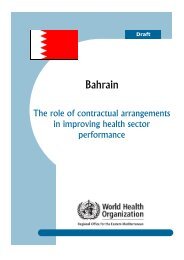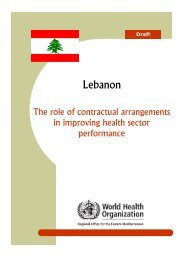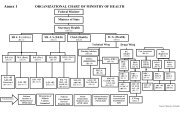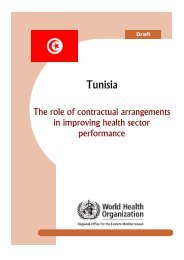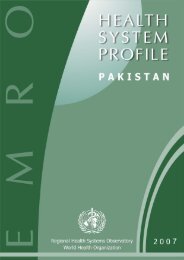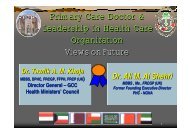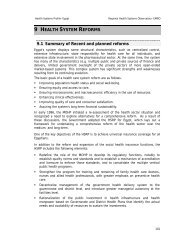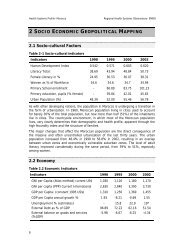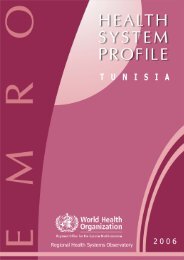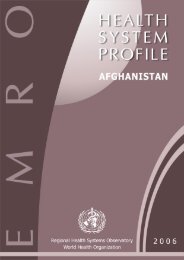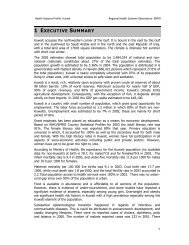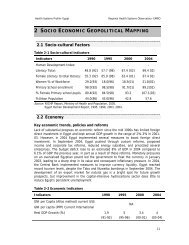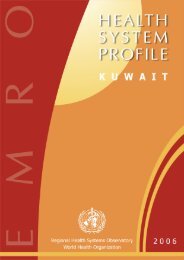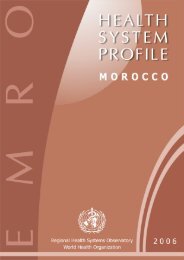Social determinants of health in countries in conflict - What is GIS ...
Social determinants of health in countries in conflict - What is GIS ...
Social determinants of health in countries in conflict - What is GIS ...
Create successful ePaper yourself
Turn your PDF publications into a flip-book with our unique Google optimized e-Paper software.
28 <strong>Social</strong> <strong>determ<strong>in</strong>ants</strong> <strong>of</strong> <strong>health</strong> <strong>in</strong> <strong>countries</strong> <strong>in</strong> <strong>conflict</strong><br />
•<br />
•<br />
•<br />
•<br />
attacks on <strong>health</strong> care providers and patients;<br />
attacks on medical convoys and ambulances;<br />
barriers, checkpo<strong>in</strong>ts and barrier walls that obstruct access to care;<br />
the politicization <strong>of</strong> <strong>health</strong> services, result<strong>in</strong>g <strong>in</strong> d<strong>is</strong>crim<strong>in</strong>ation <strong>in</strong> the prov<strong>is</strong>ion <strong>of</strong><br />
<strong>health</strong> care on the bas<strong>is</strong> <strong>of</strong> social identity.<br />
In Iraq, many other breaches <strong>of</strong> medical neutrality have been recorded. Armed men<br />
have entered hospitals, demanded treatment for their <strong>in</strong>jured comrades or have randomly<br />
attacked <strong>health</strong> staff. Like teachers and university pr<strong>of</strong>essors, <strong>health</strong> staff are captured for<br />
ransom, they are assumed to belong to families who can pay the ransom and are targeted<br />
also because they work for the government. Iraqi Red Crescent employees have also<br />
been attacked [37,59,60].<br />
In the occupied Palest<strong>in</strong>ian territory, the Red Crescent Society <strong>is</strong> the ma<strong>in</strong> provider<br />
<strong>of</strong> ambulance services. Between 29 September 2000 and 31 December 2005, they<br />
reported that 1905 ambulances were prevented from reach<strong>in</strong>g hospitals, 36 drivers and<br />
medical personnel were killed and 457 <strong>in</strong>jured, and 351 <strong>health</strong> facilities were attacked<br />
[61]. Furthermore, accord<strong>in</strong>g to the civil society report, the blockade on goods enter<strong>in</strong>g<br />
occupied Palest<strong>in</strong>ian territory seriously affects Palest<strong>in</strong>ian <strong>health</strong> services, mak<strong>in</strong>g it very<br />
difficult for the M<strong>in</strong><strong>is</strong>try <strong>of</strong> Health to import raw materials for local manufacture or to<br />
procure medic<strong>in</strong>es from outside the occupied Palest<strong>in</strong>ian territory.<br />
Stress, d<strong>is</strong>tress and d<strong>is</strong>ease<br />
The progression from stress to d<strong>is</strong>tress to d<strong>is</strong>ease <strong>is</strong> seen as the third major<br />
determ<strong>in</strong>ant, an <strong>in</strong>termediate determ<strong>in</strong>ant that results from constant, unremitt<strong>in</strong>g<br />
exposure to life-threaten<strong>in</strong>g situations, the f<strong>in</strong>al outcome <strong>of</strong> which <strong>is</strong> a d<strong>is</strong>abl<strong>in</strong>g mental<br />
<strong>health</strong> problem. Mental <strong>health</strong> <strong>in</strong> <strong>conflict</strong> sett<strong>in</strong>gs deserves a prom<strong>in</strong>ent place <strong>in</strong> analys<strong>is</strong><br />
as it <strong>is</strong> l<strong>in</strong>ked to extreme stress, especially as deriv<strong>in</strong>g from the structural determ<strong>in</strong>ant,<br />
the loss <strong>of</strong> human rights to security and basic needs. Poor mental <strong>health</strong> and the <strong>in</strong>ability<br />
to cope with daily life are the cumulative result <strong>of</strong> deprivations found <strong>in</strong> all <strong>countries</strong><br />
<strong>in</strong> <strong>conflict</strong> situations. As there <strong>is</strong> no universal response to <strong>conflict</strong> and its deprivations,<br />
there <strong>is</strong> no universal measurement <strong>of</strong> mental <strong>health</strong> [19].<br />
In Iraq, <strong>in</strong> June 2005, after 12 years <strong>of</strong> economic sanctions and two wars, there<br />
were approximately 5 million people (20% <strong>of</strong> the population) experienc<strong>in</strong>g “significant<br />
psychological symptoms” and at least 300 000 people suffer<strong>in</strong>g from “severe mental<br />
<strong>health</strong>-related conditions” [62]. Of the 2000 people <strong>in</strong>terviewed <strong>in</strong> 18 prov<strong>in</strong>ces <strong>of</strong> Iraq<br />
<strong>in</strong> late 2006—a period <strong>of</strong> <strong>in</strong>creas<strong>in</strong>g <strong>in</strong>security for the civilian population—92% feared<br />
be<strong>in</strong>g killed <strong>in</strong> an explosion and 60% said that the level <strong>of</strong> violence had caused them to<br />
have panic attacks [63]. Such high levels <strong>of</strong> mental d<strong>is</strong>tress are likely to affect people<br />
for many years to come.<br />
SDH-chapters-<strong>countries</strong> <strong>in</strong> <strong>conflict</strong>-7 Oct.<strong>in</strong>dd 28 08/10/2008 14:24:50



